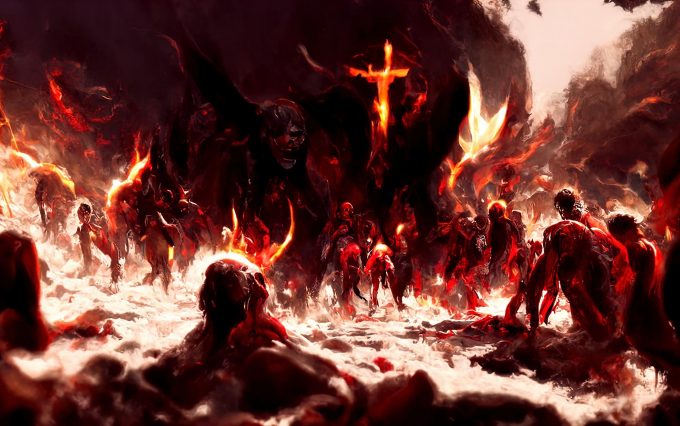
9th June 2022
Fiction
7 minutes read
Fallen Angels
translated by Jonathan Gresty

9th June 2022
7 minutes read
“You’ll end up in hell, you Antichrists,” Granny Zuzana would scold the boys whenever they did anything wrong. Putting four more buchty into the pot to steam, she’d inevitably notice that two from earlier had disappeared. “They’re lively lads,” Grandad Martin would say, smiling genially. “Antichrists like you, more like,” retorted the old woman, fired up by housework and a holy anger which genuinely upset the boys. In that state between sleep and wakefulness, they would often get her face mixed up with the Virgin Mary‘s. And they were sorry they weren’t as good as Jesus; Granny Zuzana deserved better grandsons. How it hurt and exhausted her to get angry like that! Fighting with the devil that tempted them was more than she could manage.
Dano and Samo loved their Granny Zuzana, not just for her steamed buchty, but for other things, her strawberry mousse, for instance. And they were much less afraid of hell than of her anger. Which made it two to one in favor of crime: how could they not succumb to temptation? They had to rely a great deal on God’s grace – and even more so on their grandmother’s goodness of character. According to her, hell was full of horned ruffians, their long tongues hanging out, their every move noisy clatter. “We know!” the boys cried in unison. “Grandad has told us all about it!”
A person will get used to what he knows.
Dano and Samo tried hard to avoid their grandmother’s wrath; after all, Grandad Martin had whispered to them that you can’t resist a force of nature. A moment earlier it had come to light that they’d torn down a swallows’ nest in the barn. And they were altar boys! Before going to sleep they would kneel by their beds and look up at the picture of an angel escorting two children across a dilapidated bridge high above a deep gorge. They always washed their hands and crossed themselves before eating, even in the school canteen. When they did something naughty, they tried their best to keep Granny in the dark. When it somehow got back to her that they had stolen a tube of yellow tempera from school or pulled the pigtails of their classmate Jana G., they promised they would confess to it in church and never do it again. They went to school on time, were attentive during lessons, and never answered back in class. When the time came, they became pioneers; later they made their vows, swearing to love and defend their socialist motherland.
“They have their version of things, we have ours,” she said in response to all their questions. She never asked why they did the naughty things they did. “She might find out what she needn’t know,” said Grandad with a wry smile. Dano and Stano always confessed, though; otherwise their regret would consume them. And so, she found out they had torn down the nest full of swallow chicks because they wanted to train them like parrots and thought it best to start while the birds were still young.
Tears of remorse dripped into their wild strawberry mousse
when they explained how they’d taken the tempera from Mrs Píšová’s cupboard because the chicks weren’t very yellow. “Hens’ eggs and chicks are yellow thanks to green grass,” the old woman reminded them, though they all knew how boring it was to watch those stupid little creatures graze. “You’ll still end up in hell,” Granny said, waving her hand dismissively when they promised they would be good. “Antichrists!” she added and wailed together with them.
Uncle Demčák, school caretaker and stoker, was the person they most associated with the Antichrist. The hell their grandfather described was much like the school boiler room: underground, chipped concrete steps leading down to a rusty door covered in coal dust; inside all noise, dust, darkness and rust with chains, tongs, spades and forks hanging from the walls; its only window partially covered by dusty old portraits of grim-looking men whom Dano and Samo could not identify: were they former stokers or prominent sinners who had burned to death in the huge cast iron boiler? Uncle Demčák lazed on a pile of beer crates. “Come here, you two Antichrists,” he bawled whenever they appeared. “Why did you pull Jana’s pigtails?” he demanded when they complained of the smacking they’d get at home. “Because she sits in front of us.” “And did both of you pull them?” “Of course,” they nodded as one. “There are two of us and she’s got two pigtails.” “Yes, but there’s just one of her.” Time would pass before the boys understood this mysterious remark of stoker, caretaker and sexton in one.
Uncle Demčák had chosen Dano and Samo as his proteges because they were the most reliable altar boys. The candles were always lit and the missal open at the right page.
“Watch closely,”
he told them in the sacristy as they prepared the ornaments for Mass together with the bread and wine which in a few minutes would change into the body and blood of Christ, “One of you will take over from me.” “And the other?” they asked once they’d got a little bolder. “He’ll end up in hell,” said the stoker with a grin, waving a hand in the direction of what they assumed was the boiler room.
All their classmates, even the older ones – ninth-years excepted, envied them their license to go down there. A ninth-year could slip down to the boiler-room whenever he wanted to skip a dictation, test or rope-climbing – if he took two cigarettes, that was. Uncle Demčák couldn’t send ninth-years to the shop; they might not come back, he explained to the cousins when they asked him about it. The ninth-years were big shots, the cleverest of whom was appointed projectionist in the local cinema by the village’s three biggest authorities: the school headmaster, his deputy (also local party chairman) and the village priest. When Dano and Samo were in their eighth year, this luminary was called Vilo N. He owned a little moped and rode it to pick up the film cassettes from the train. As the station was two kilometers from the village, he was an obvious choice for the job.
Throngs of pupils carrying paper lanterns emerged from the school on the hill above the village and walked past the cemetery towards the church. There they observed a minute’s silence in front of the memorial to the two world wars. The procession marked the fiftieth anniversary of the 1917 Bolshevik Revolution and was led by prize-winning pupils carrying portraits of leaders of the world proletariat as well as of the party and government. The bearded statues of Saints Cosmas and Damian eyed the bearded images of Marx, Engels and Lenin going past, amongst whom smooth-faced President Novotný looked like a milksop. And even though Chairman of the Presidium of the Supreme Soviet Brezhnev also had no beard, he made up for it with his splendidly bushy eyebrows. Jana G., winner of the school round of the “What do you know about the Soviet Union?” quiz, carried the main banner with a shining hammer and sickle on a red background and ‘GOSR 1917 – 1967’ written above it. She stood between Dano and Samo, who were holding the state flag.
They had earned this extraordinary honor through their work as altar boys
– especially at funerals, where they carried black flags and Jesus on the Cross.







